April 2025 Highlights and Hot Topics
-
-
-
-
-
- Message from the Executive Director
- Public Policy Update (as of 4/24/25)
- Community Voices Shape Future of Disability Policy at NCCDD Listening Session in Wilmington
- Your Voice Matters! Take NCCDD’s State Plan Survey
- Laura Newell: Living an Independent Life and Advocating with and for Others
- Hispanic Disability Outreach: April is Autism Acceptance Month
- May Self-Advocate Discussion Series: Transportation and Travel
- Boletín en español
- Newsletter in Accessible Audio
-
-
-
-
Message from the Executive Director
NCCDD and our Partners are Critical. Our Funding is at Risk.
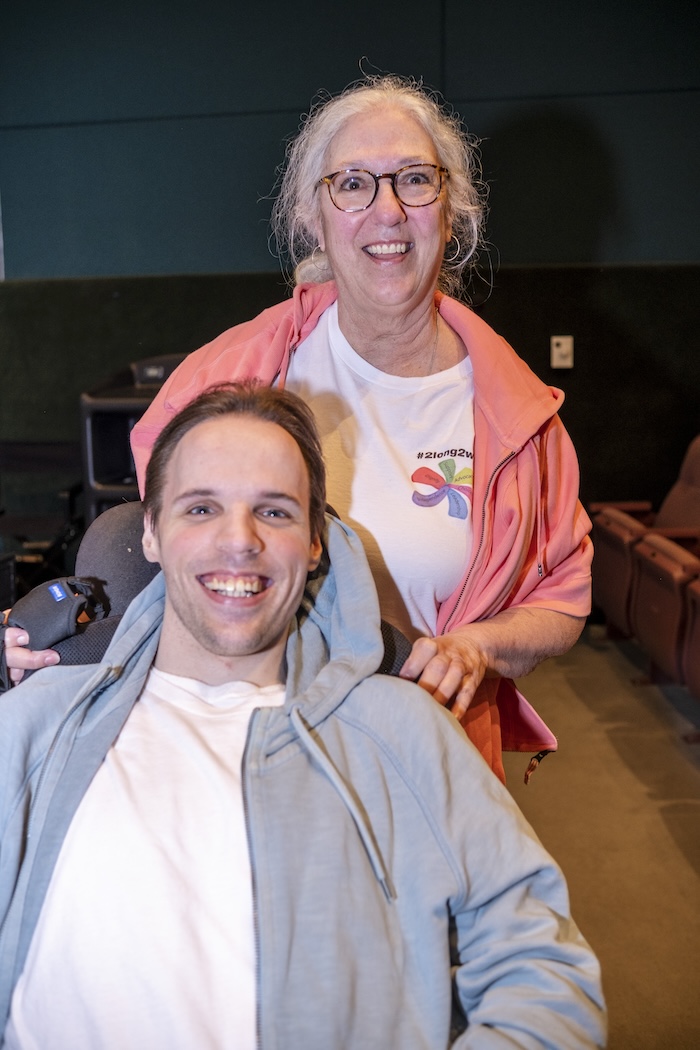 Matt and Sara Potter
Matt and Sara Potter
The North Carolina Council on Developmental Disabilities “is the heartbeat of countless life-enriching programs and services for people with disabilities across the state,” wrote Matt Potter, who is a Winston-Salem leader with cerebral palsy. “If the Council was not able to function . . ., the effect on the disability community would be absolutely catastrophic.”
NCCDD’s funding was shown to be at risk when a budget document was leaked that proposed eliminating funding in FY 2026 for Developmental Disability Councils, Protection and Advocacy Organizations, University Centers for Developmental Disabilities and many other critical organizations.
Zero funding would likely end our work. Our work is critical. The following are some of the important ways we serve the disability community in North Carolina.
NCCDD incubates innovative services to the I/DD community year after year. NCCDD’s initiatives have included: a Reentry Initiative, Peer Mentoring, First in Families, Alternative Approaches to Guardianship, Leadership Training, Emergency Preparedness, Medical Health Homes, and Post-Secondary Education programs. NCCDD incubates critical programs that are sustained through their successes long after NCCDD funding expires.
NCCDD is there when crises hit North Carolina. This was true during Hurricane Helene, COVID, and Hurricane Florence. In September, two days after Helene hit the state, NCCDD mobilized daily calls with emergency responders, disability leaders, state and federal emergency leaders, impacted communities, and disability providers focused on the safety and welfare of the disability community across western North Carolina. NCCDD’s work led to outreach to every person with a disability in the Tailored Plans across western North Carolina. This work saved lives.
NCCDD has been a critical champion on the waiting list, Direct Support Professional workforce, and employment. Ten thousand people with I/DD have started receiving new services through a program called 1915(i). While NCCDD did not create this program, it worked directly with state leaders to ensure the program started and that it is successful.
NCCDD drives economic impact for local communities throughout North Carolina. A recent study by UNC Greensboro shows that for every dollar spent on I/DD services in North Carolina an additional $1.17 to $1.63 is generated in the community. NCCDD was a driving force in 2023 to increase pay for Direct Support Professionals. This work generated over two hundred million dollars a year in North Carolina, according to the UNC-G study. Additionally, we estimate our Reentry initiative saved North Carolina millions of dollars. It had an 88% success rate by keeping 206 people with I/DD from returning to prison.
NCCDD does the critical work of educating families and individuals with I/DD of the supports they can obtain throughout their lifetime. It works to ensure people with I/DD disabilities are more independent and have meaningful jobs.
Most importantly, NCCDD brings the disability community together with leaders from both parties to make North Carolina better for people with I/DD. NCCDD is bipartisan and nonpartisan. It is critical that the work of NCCDD continues.
Talley Wells, NCCDD Executive Director
Public Policy Update (as of 4/24/25)
FEDERAL
Congressional Budget Process
On April 5, 2025, the Senate passed their budget resolution which includes a reduction of $880 billion to Energy and Commerce which is where the Medicaid budget is housed. Senators Josh Hawley (R-MO) and Ron Wyden (D-OR) cosponsored an amendment to remove language in the budget resolution which would direct the House Energy and Commerce Committee to cut $880 billion. That amendment was defeated 50-49.
On April 10, 2025, the House of Representatives passed this updated budget resolution.
The reconciliation process has now begun, and committees have been instructed to write legislation that will extend President Trump’s 2017 tax cuts, increase funding in some areas (border security, increase defense spending), and make reductions to Medicaid and other programs in Energy and Commerce.
Medicaid comprises $8.2 trillion out of the $8.6 trillion in mandatory spending that Energy and Commerce must use to come up with spending reductions (assuming Medicare cuts are off the table). As a result, major cuts to Medicaid appear to be the only way to meet the budget resolution requiring $880 billion spending reductions.
There are a variety of options available for cutting Medicaid including per capita caps, lowering the match rates for states, and reducing Affordable Care Act match rates - all of these would leave the states facing difficult choices to raise revenues or cut spending. Cuts to Medicaid spending could mean dropping coverage for some people, eliminating coverage of high-cost optional benefits, or cutting payment rates to health plans and providers.
Protect Our Care has an easy tool to find your elected official and some advice on what to say - https://www.protectourcare.org/hands-off-medicaid. Call your Member of Congress and educate them on the importance of Medicaid for people with disabilities and their families and caregivers.
President’s Budget
On April 16, 2025, a draft of the President’s budget was leaked, and it included proposed budget cuts of $40 billion from the US Department of Health and Human Services. Many disability-related programs were identified for elimination including Developmental Disability Councils, Developmental Disability Protection & Advocacy, Projects of National Significance, the National Institute on Disability, Independent Living, and Rehabilitation Research and University Centers for Excellence in Developmental Disabilities.
While the President’s budget is required to be submitted each year, it is not law. Congress receives it but is not required to implement it. However, it does indicate the policy and funding priorities of the administration. This budget indicates a desire to dramatically cut disability programs.
Protect Our Care has an easy tool to find your elected official and some advice on what to say - https://www.protectourcare.org/hands-off-medicaid. Call your Member of Congress and educate them on the importance of Medicaid for people with disabilities and their families and caregivers, and the importance of disability programs in the Department of Health and Human Services.
Department of Health and Human Services (DHHS) Restructuring
The federal DHHS is being reorganized and is moving from 28 divisions down to 15. The workforce is being downsized by 20,000 employees. As part of these reductions, the Administration of Community Living (ACL) was eliminated. Programs that were part of the ACL, including DD Councils and Protection and Advocacy agencies, have been moved to other divisions. While for the immediate future, it appears that the funding will be maintained for these programs, the loss of expertise in these divisions and the threat of cuts threatens the future of the vital services provided by these agencies.
STATE
Legislative Budget
The Senate passed its proposed budget on April 17, 2025. The budget did not include rate increases for DSPs or Innovations waiver slots. Also missing were increases for exceptional children funding or additional funds for Employment and Independence for People with Disabilities (EIPD) which would have allowed North Carolina to pull down federal funds.
The only funding related to people with I/DD in the budget was directed to Community Colleges to expand I/DD programs from 15 to 25 statewide.
The budget now has been sent to the House where they will develop their proposed budget. Any differences will be worked on in a conference committee.
Bills of Interest
Sam’s Law (HB 4) – Requires action plans for students with certain medical conditions.
Driver’s License Designation/Autism (HB 21) – DMV would be required to develop a designation of autism on licenses, upon request. This bill also includes training for officers.
Create Alert/Missing Person with Disability (H8 57) – Requires creation of an alert for missing persons with disabilities within the NC Center for Missing Persons. The Center would work with law enforcement to develop guidelines for missing persons with disabilities.
The DAVE Act (S 474) – This bill would require the office of the State Auditor to establish a Division of Accountability, Value, and Efficiency (DAVE).
- Every executive branch/State agency would be required to report to DAVE annually to justify each agency’s continuing existence and the continuing need for any vacant positions.
- The bill would also authorize the use of AI for DAVE to examine agency records and budgets for amounts spent, duplicative spending, and the effectiveness of expenditures regarding their intended purpose.
- DAVE would then report to the NCGA annually and have the authority to recommend dissolving agencies and eliminating positions within agencies.
Community Voices Shape Future of Disability Policy at NCCDD Listening Session in Wilmington
Dozens of individuals with intellectual and developmental disabilities (I/DD), their families, and advocates gathered at the Courtyard by Marriott Carolina Beach Oceanfront on April 15th to take part in a powerful community listening session hosted by the North Carolina Council on Developmental Disabilities (NCCDD).
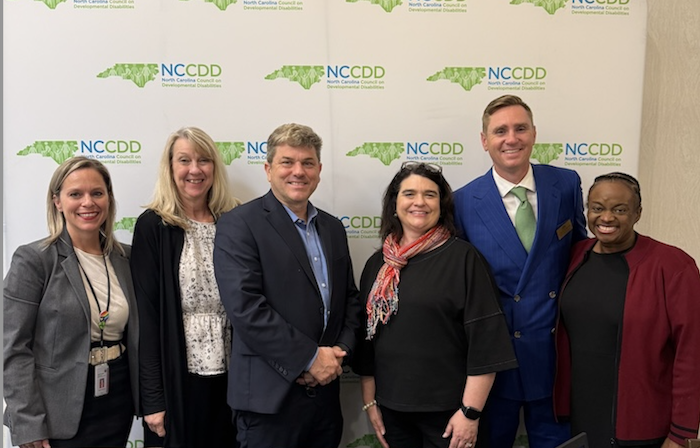 The event drew local residents with I/DD, families, and professionals to voice urgent concerns—and share ideas—about building a more inclusive North Carolina.
The event drew local residents with I/DD, families, and professionals to voice urgent concerns—and share ideas—about building a more inclusive North Carolina.
Judge J.H. Corpening opened the evening by reflecting on North Carolina’s 2017 adoption of “Raise the Age,” which moved 16- and 17-year-olds out of the adult criminal justice system. As the last state in the nation to make this change, Judge Corpening noted the positive outcomes: cost savings, higher graduation rates, and the success of school justice partnerships now active in 60 counties. “When programs help kids stay in school and save money, the General Assembly takes notice,” he said.
Community leaders continued to spotlight local impact and progress. Curtis Hill of Disability Rights NC, a Wilmington resident, was honored for his national advocacy, particularly around Hurricane Helene recovery efforts. He encouraged attendees to “have a plan you can implement with your friends and neighbors,” when discussing hurricane preparedness as the season will start in June.
Gloria Garton, Executive Director of the North Carolina Statewide Independent Living Council, headquartered in Wilmington, shared about the importance of independent living and how NC SILC supports Centers for Independent Living across the state.
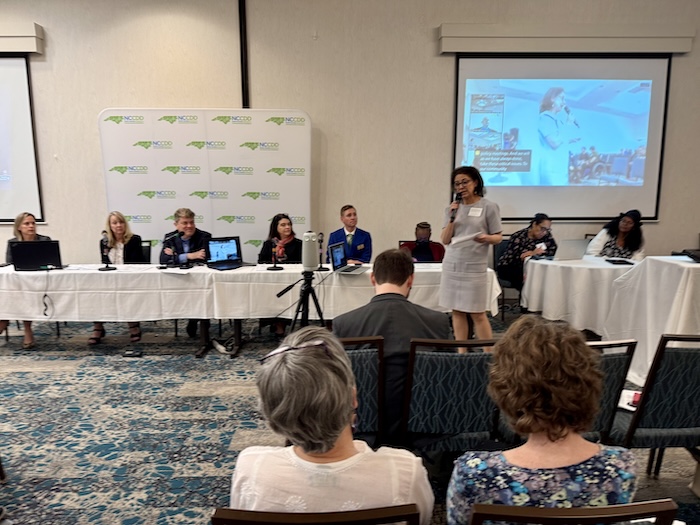 Rev. Dr. Charlrean Mapson, NCCDD Council Member, shared her personal journey into advocacy, delivering a clear call to action: “Our children won’t have an education if we don’t fight for it.”
Rev. Dr. Charlrean Mapson, NCCDD Council Member, shared her personal journey into advocacy, delivering a clear call to action: “Our children won’t have an education if we don’t fight for it.”
The theme of education continued as Ryan Wennerlind, Director, Inclusive Futures Program, UNC-Wilmington, spoke about the college’s new Inclusive Postsecondary Education (IPSE) program for students with I/DD. Launching in Fall 2025, the program aims to boost self-determination, job readiness, and independent living. “There is a movement to help students go to college,” Wennerlind said. “Now, it’s about thinking higher—thinking college.”
Ginger Yarbrough, Clinical Director, Developmental Disabilities, Div. MHDDSUS, NC DHHS, updated the group on federal changes through the Administration for Community Living (ACL), including expanded TBI grant funding and a renewed focus on home- and community-based services. She praised the work being done by those supporting individuals with I/DD, the success of 1915(i), and more.
Following the panel, NCCDD opened the floor for listening to community members on what concerns and issues matter most to them.
Many brought up the importance of creating full-time roles for Direct Support Professionals as DSPs, and families continued to ask, “What happens after school?” for their child with a disability.
The listening session not only gave voice to challenges but also laid the groundwork for NCCDD’s next Five-Year Plan. Participant input will be used to inform both state and federal policymakers, helping shape decisions that directly impact the I/DD community.
Your Voice Matters! Take NCCDD’s State Plan Survey
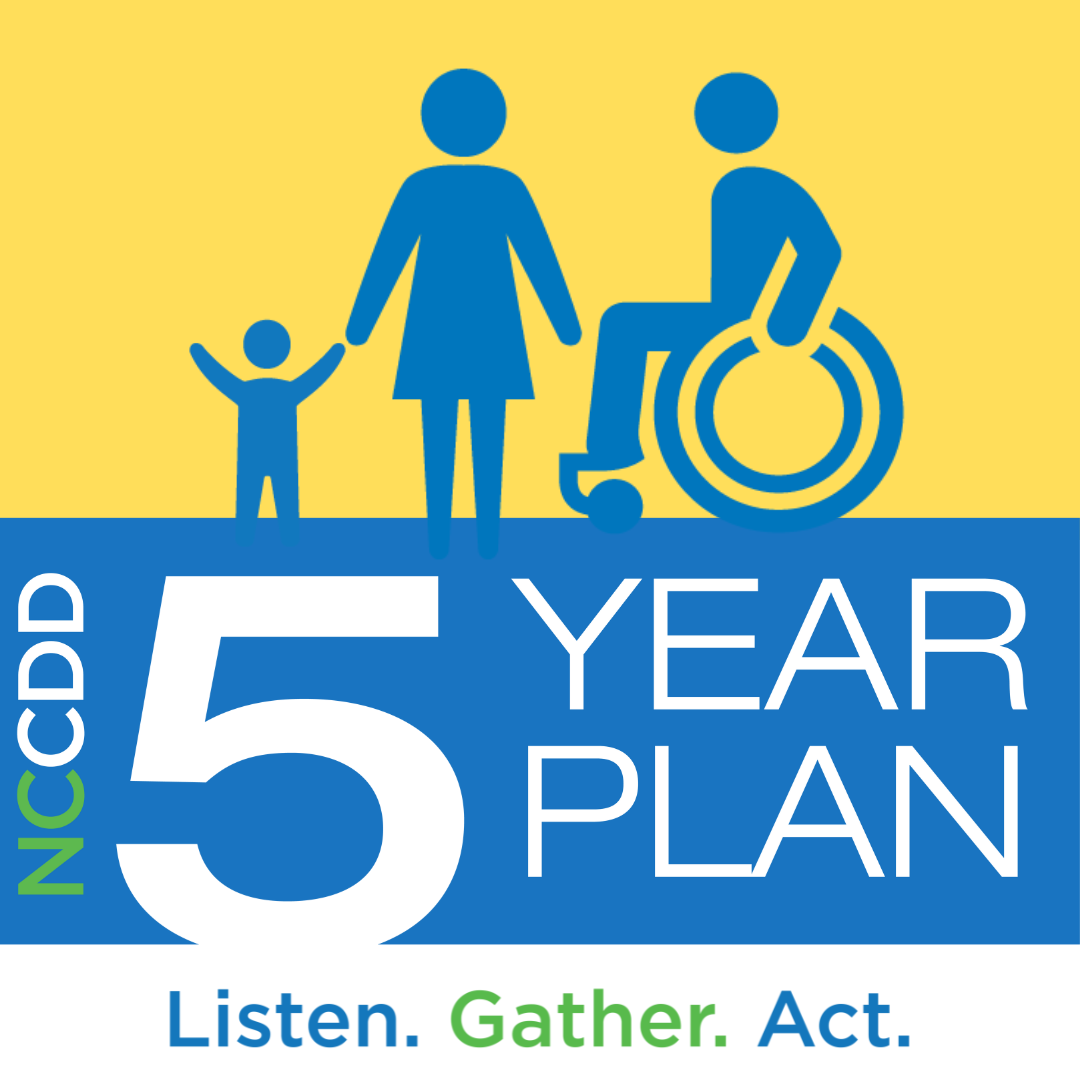 The North Carolina Council on Developmental Disabilities (NCCDD) is planning its priorities for the next five years — and your voice matters.
The North Carolina Council on Developmental Disabilities (NCCDD) is planning its priorities for the next five years — and your voice matters.
Every five years, NCCDD creates a State Plan to guide how it funds programs and supports for people with intellectual and developmental disabilities (I/DD) in North Carolina. The next plan will cover 2027 to 2031, and right now, NCCDD is asking for public input to help shape it.
If you’re a person with I/DD, a family member, caregiver, or someone who works in the field, your feedback is important. The Council wants to know what’s working, what’s missing, and what needs to change.
“This is our chance to hear directly from people with I/DD and their families,” said Talley Wells, Executive Director of NCCDD. “We want to make sure our future work reflects their needs.”
The plan will be approved by NCCDD’s Council, which includes people with I/DD, family members, and representatives from state agencies and organizations.
Take the survey now (available in English and Spanish) and help shape the future of services and supports in North Carolina: https://nccdd.org/the-council/five-year-plan
Deadline is May 31, 2025.
Laura Newell: Living an Independent Life and Advocating with and for Others
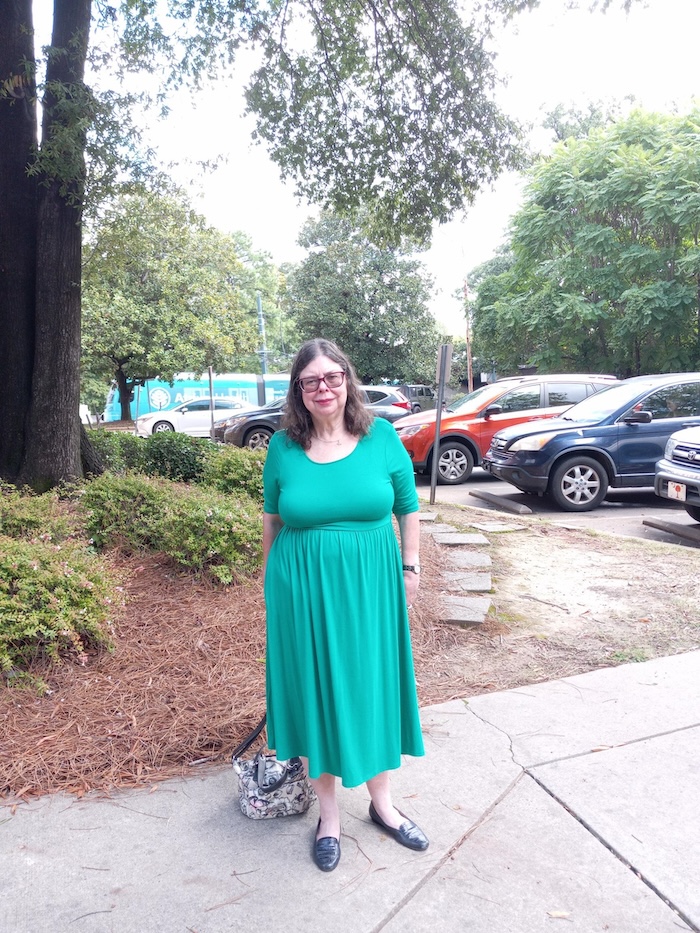 During Developmental Disabilities Awareness Month, the North Carolina Council on Developmental Disabilities (NCCDD) invited people with intellectual or developmental disabilities (I/DD) to share their stories through the My Story Matters campaign. Many people shared their experiences, and we’re thankful they took the time to do that. One of those stories is from Laura Newell in Charlotte, NC. Here is her story, in her own words.
During Developmental Disabilities Awareness Month, the North Carolina Council on Developmental Disabilities (NCCDD) invited people with intellectual or developmental disabilities (I/DD) to share their stories through the My Story Matters campaign. Many people shared their experiences, and we’re thankful they took the time to do that. One of those stories is from Laura Newell in Charlotte, NC. Here is her story, in her own words.
I am the founder of the Self-Advocates of Mecklenburg group that I started in November 1998. It is important that I am independent, and I live in a condo with my husband Rob and our two cats. I enjoy working at InReach as an office assistant and a peer mentor at the day support center and I have been working there almost 32 years. I love working with people who have disabilities. I also love to write books and short stories.
It is important that everyone knows their rights and everyone is treated fairly. I receive services from InReach to have a community coach that helps me achieve my goals with the Self-Advocate group or getting my books published. She helped when we moved three times in three years due to my husband needing a more accessible place to live. I don't want the funding cut for the services that she provides for me.
Hispanic Disability Outreach: April is Autism Acceptance Month
Every April marks Autism Acceptance Month—an opportunity to go beyond simply recognizing what autism is. This month encourages understanding, valuing, and respecting autistic individuals.
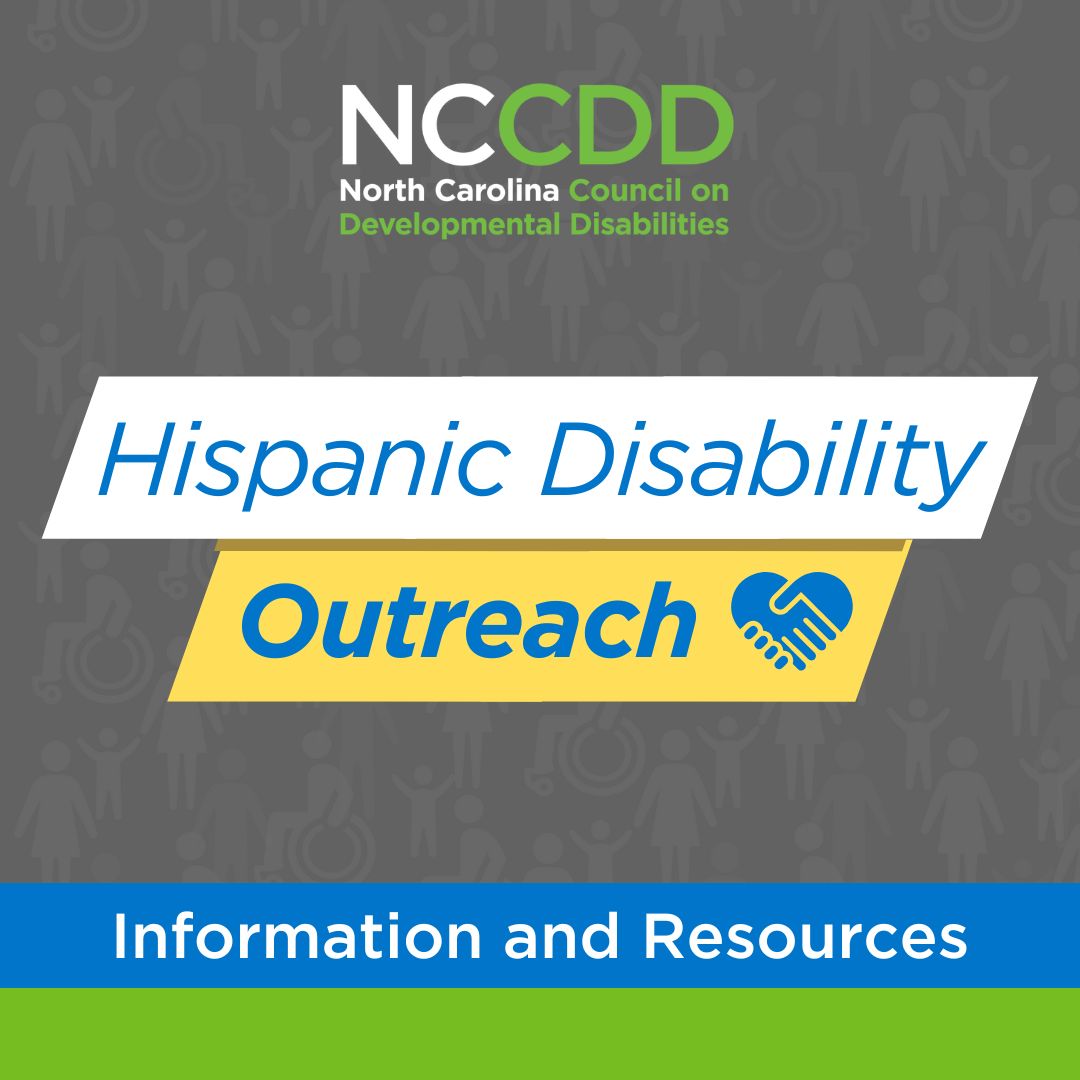 What is Autism?
What is Autism?
According to the Centers for Disease Control and Prevention (CDC), autism, or Autism Spectrum Disorder (ASD), is a developmental disability caused by differences in the brain. People with ASD may behave, communicate, interact, and learn in ways that are distinct from most individuals. Signs of ASD appear in early childhood and usually last throughout life. (https://www.cdc.gov/autism/about/index.html)
The Autism Self-Advocacy Network (ASAN) is an advocacy group made up of people with autism. They describe autism from their perspective on their website. They write:
"There is no one way to be autistic. Some autistic people can speak, and some autistic people need to communicate in other ways. Some autistic people also have intellectual disabilities, and some autistic people don’t. Some autistic people need a lot of help in their day-to-day lives, and some autistic people only need a little help. All of these people are autistic, because there is no right or wrong way to be autistic. All of us experience autism differently, but we all contribute to the world in meaningful ways." (https://autisticadvocacy.org/about-asan/about-autism/)
The Importance of Acceptance
Accepting autistic individuals means recognizing their dignity, celebrating their contributions, and ensuring they can fully participate in society. Acceptance goes beyond awareness—it seeks to build a world where all people, regardless of neurological differences, are respected and valued.
- Acceptance can be expressed in many ways, including but not limited to:
- Listening to the voices and experiences of autistic individuals.
- Promoting accessibility and reasonable accommodations in all spaces.
- Challenging stigmas and myths about autism.
- Fostering inclusive communities where everyone has the opportunity to thrive.
The North Carolina Council on Developmental Disabilities (NCCDD) actively works to promote independence, self-determination, and full participation for individuals with developmental disabilities, including those on the autism spectrum. This month—and all year long—NCCDD reaffirms its commitment to building a fairer society where acceptance and respect serve as the foundation of all interactions.
En español: Abril: Mes de la Aceptación del Autismo
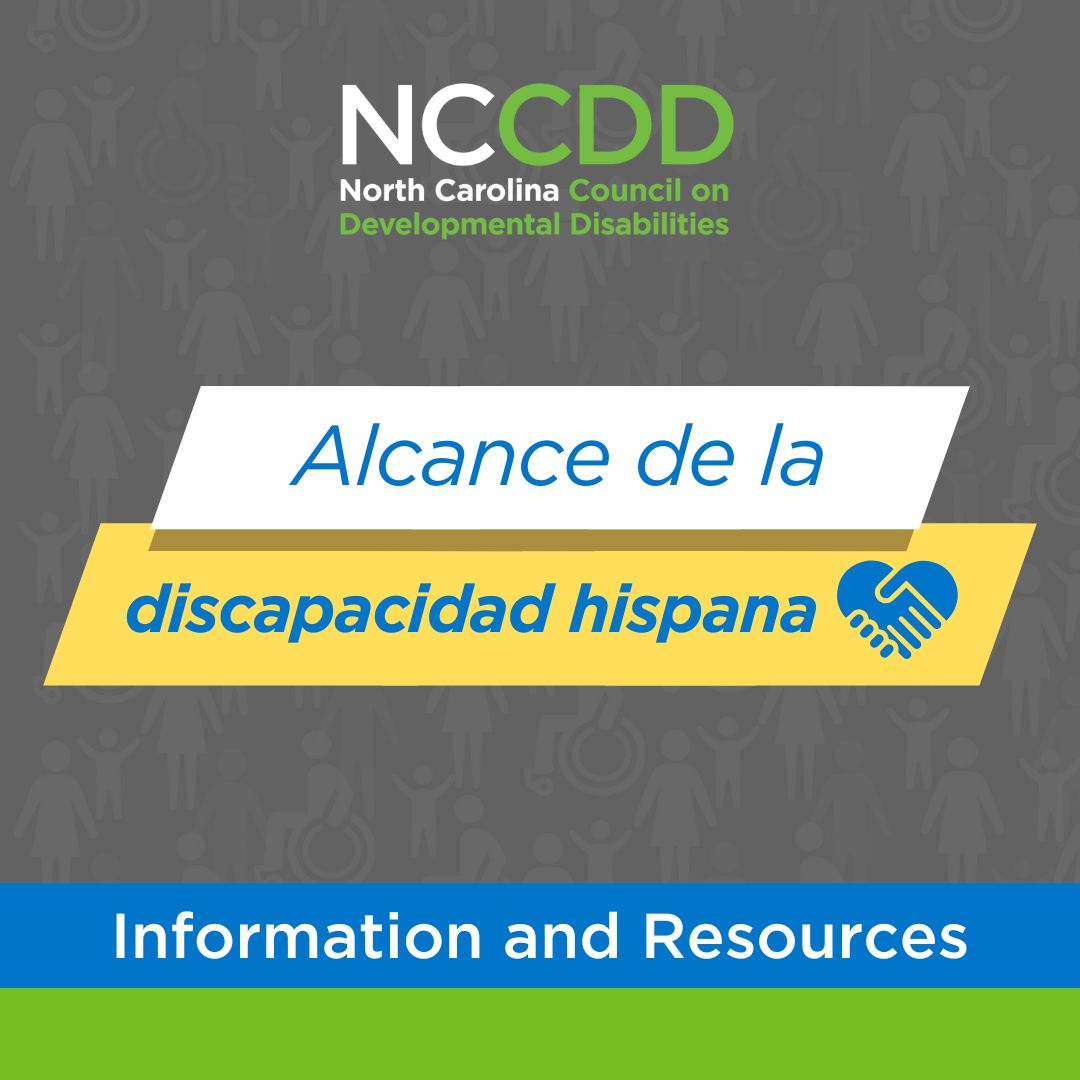 Cada abril se celebra el Mes de la Aceptación del Autismo, una oportunidad para ir más allá del simple reconocimiento de qué es el autismo. Este mes fomenta la comprensión, la valoración y el respeto hacia las personas autistas.
Cada abril se celebra el Mes de la Aceptación del Autismo, una oportunidad para ir más allá del simple reconocimiento de qué es el autismo. Este mes fomenta la comprensión, la valoración y el respeto hacia las personas autistas.
¿Qué es el autismo?
Según los Centros para el Control y la Prevención de Enfermedades (CDC), el autismo, o Trastorno del Espectro Autista (TEA), es una discapacidad del desarrollo causada por diferencias en el cerebro. Las personas con TEA pueden comportarse, comunicarse, interactuar y aprender de maneras distintas a la mayoría de las personas. Los signos del TEA aparecen en la primera infancia y generalmente duran toda la vida. (https://www.cdc.gov/autism/about/index.html)
La Red de Autodefensa Autista (ASAN) es un grupo de defensa formado por personas con autismo. Ellos describen el autismo desde su perspectiva en su sitio web. Escriben:
"No hay una sola manera de ser autista. Algunas personas autistas pueden hablar, y algunas personas autistas necesitan comunicarse de otras maneras. Algunas personas autistas también tienen discapacidades intelectuales, y algunas personas autistas no las tienen. Algunas personas autistas necesitan mucha ayuda en su vida diaria, y algunas personas autistas solo necesitan un poco de ayuda. Todas estas personas son autistas, porque no hay una manera correcta o incorrecta de ser autista. Todos experimentamos el autismo de manera diferente, pero todos contribuimos al mundo de maneras significativas." (https://autisticadvocacy.org/about-asan/about-autism/)
La importancia de la aceptación
Aceptar a las personas autistas significa reconocer su dignidad, celebrar sus contribuciones y garantizar que puedan participar plenamente en la sociedad. La aceptación va más allá de la concienciación: busca construir un mundo donde todas las personas, independientemente de sus diferencias neurológicas, sean respetadas y valoradas.
- La aceptación puede expresarse de muchas maneras, incluyendo, pero no limitado a:
- Escuchar las voces y experiencias de las personas autistas.
- Promover la accesibilidad y las adaptaciones razonables en todos los espacios.
- Desafiar los estigmas y mitos sobre el autismo.
- Fomentar comunidades inclusivas donde todos tengan la oportunidad de prosperar.
El Consejo de Carolina del Norte sobre Discapacidades del Desarrollo (NCCDD) trabaja activamente para promover la independencia, la autodeterminación y la plena participación de las personas con discapacidades del desarrollo, incluidas aquellas dentro del espectro autista. Este mes, y durante todo el año, el NCCDD reafirma su compromiso de construir una sociedad más justa donde la aceptación y el respeto sirvan como base de todas las interacciones.
May Self-Advocate Discussion Explores Adulting with I/DD 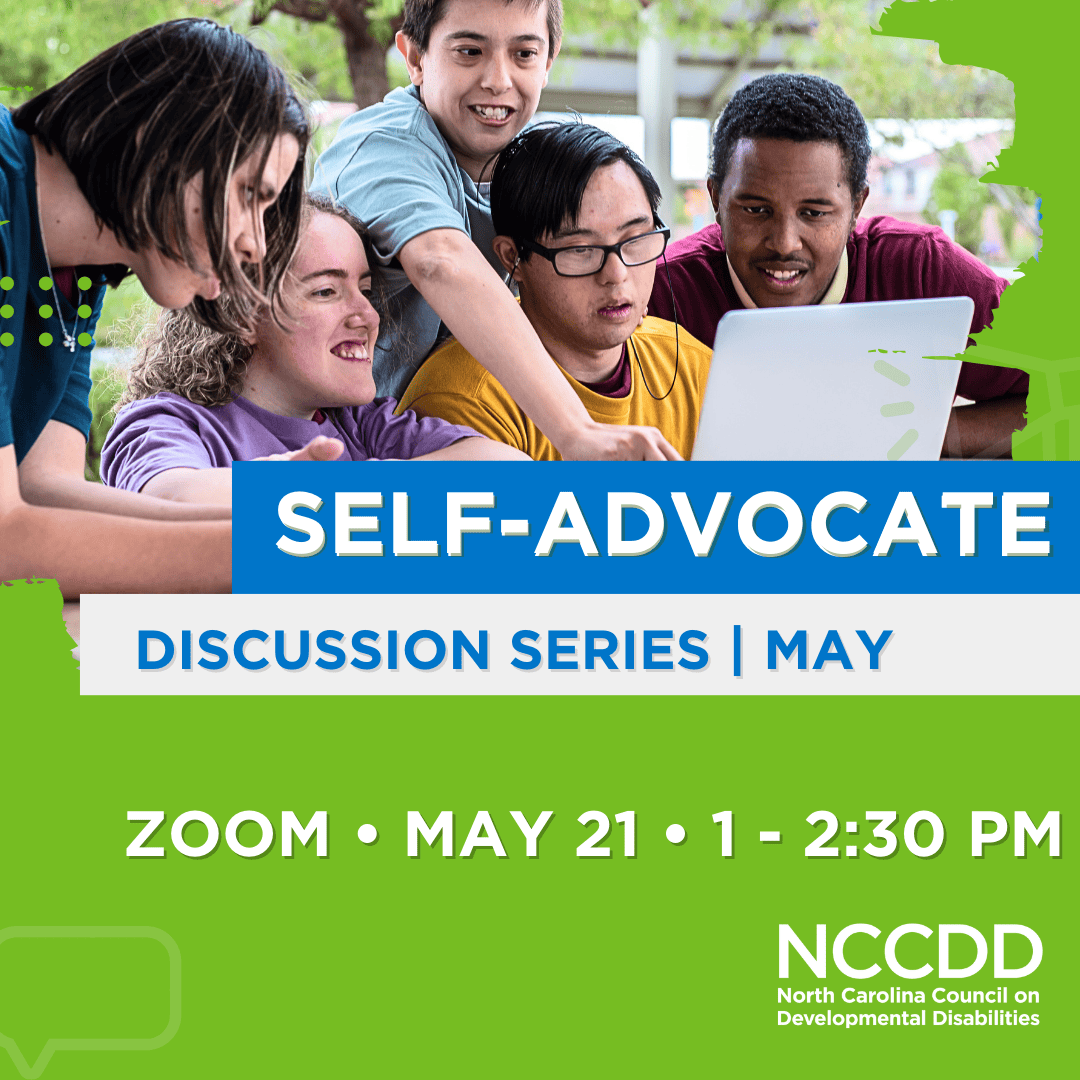
Mainstream sources say that “adulting” means to behave in an adult manner, engage in activities associated with adulthood, and attend to the ordinary tasks required of a responsible adult. In this session, guests and attendees with intellectual or other developmental disabilities (I/DD) will share their adulting stories related to relationships, working, playing, and just plain living!
Join in the conversation by sharing your stories about adulting as a person with I/DD.
The Self-Advocate Discussion Series is hosted by NCCDD every third Wednesday of the month. The series aims to keep North Carolina self-advocates informed and engaged in discussion on topics of social and systems change. Series sessions are a time to connect with others with lived experience, share common interests, develop impact strategies for telling personal stories, and stay connected with the NCCDD community. Learn more about the webinar series.
Muy pronto: Aspectos distacados y temas de interes de abril de 2025

Newsletter in Accessible Audio
Coming soon!
